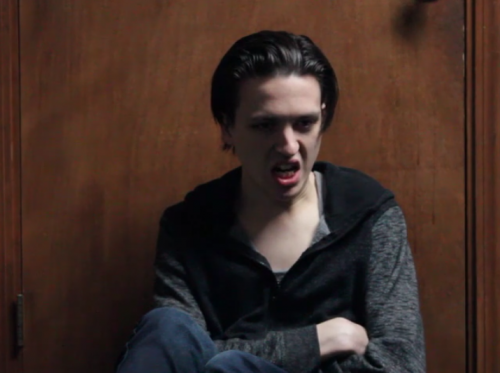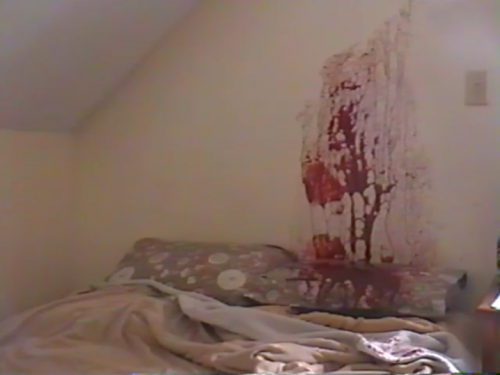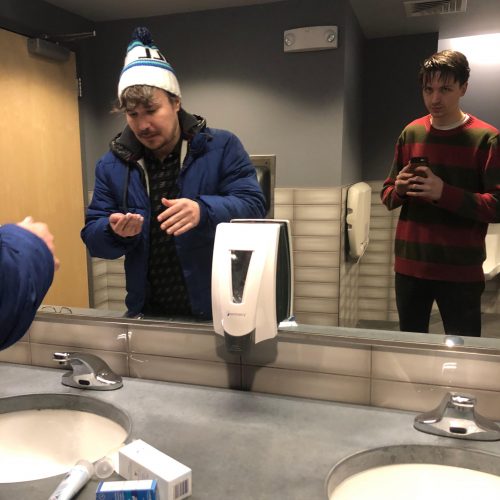Werewolves and White Men: A Conversation with Filmmaker Nick Verdi

Nick Verdi’s films are ragged. Staggeringly no budget but brimming with hideous feeling, each feels like a dry infection. As informed by the work of Jem Cohen and Kelly Reichardt as they are straight-to-video schlock, Verdi’s films function as direct lines into his fascinations: the ease with which communication breaks down; the violence inflicted by (and upon) the young; a creeping sense of apocalypse that no one else seems to notice.
Last year Nick asked me to perform in his latest short film, Angel of the Night, centering around a 35-year-old university employee whose only sincere interactions are when he’s harassing the student body. During a pre-production workshop, Verdi showed me videos of Sam Hyde, John Maus and werewolves for reference. “We’re such strange creatures, aren’t we?” he said. “White men, I mean.”
Nick Verdi: There’s this one movie Moon of the Wolf. It’s such a middle of the road, ABC movie-of-the-week from 1972. It’s a murder mystery set in Louisiana swamp land, and there’s this rich family that owns the town who lives on this giant plantation. And of course, the head of the family—this guy Andrew Rodanthe—ends up being a werewolf. He’s killing people. He kills this girl Ellie—this poor girl. “Why would this poor girl know Andrew Rodanthe—this rich white guy who owns the town?” And it’s because they were lovers and all this shit, you know. But Andrew Rodanthe is like the perfect “unreflective, refusing to reflect, emotionally detached white guy” that has spent all day completely pent up and in hell, and at night it all comes out and he does awful things, the worst fucking things because the more he doesn’t look at himself the worse it is.
And it’d always been, the explanation for the werewolfism in the movie is the sister character— who’s Barbara Rush—talking about Granddaddy. “Granddaddy always had these spells upstairs.” Then years later she realizes it was because he was drinking. And then Andrew is having these same spells. And it’s like, that’s the thing right there. The drinking is the werewolfism. You think about having some blocked memory of seeing your drunk father. The transformation. You know what I mean? It’s the eeriness, the uncanniness of the home being the safe place, but also where the most fucked up things happen. And this sense of: it’s the man with the button down shirt that is the worst thing you know. It’s all these strange, strange things I feel. It’s the main thing I always think about, you know what I mean?

B.R. Yeager: You’ve said that’s one of the things that draws you to John Maus—the way he looks like he’s about to burst out of a tight button down shirt.
NV: Exactly. It’s like I want to see the truth come out in the most violent eruption at whatever expense. The limit of this—this physical body, this form. You come against the limit of your body, and you realize you are not your body. What are you? You know, all this stuff. It’s a tornado inside this person, like what the fuck is going on inside this person, you know?
BRY: You’re talking about wanting the truth to come out, even when (or especially when) the truth is monstrous. Like letting the monstrosity out to be acknowledged. Even though that might be objectively better than holding it in, it’s still terrifying, and maybe confirming things you wish weren’t true.
NV: No, totally—like, the core is a refusal to accept truth. The more you refuse it, the worse it comes back.
BRY: Right.
NV: So it’s always like the refusal to actually self-reflect on whatever—on what you are, on who you are and those things. On things you feel and things you think, you know? Where it’s like you simply have an inability or refusal to self-reflect, or deal for whatever reason.
This topic [werewolves]—this sounds like we’re talking about white men. You know what I mean? This sounds very much like we’re talking about white men right now—the refusal to accept truth, the refusal to accept the truth in yourself. The refusal to accept.
BRY: Which only makes you more monstrous. By hiding it. Because you think that hiding your monstrous aspects will keep you from being a monster. When it’s the opposite. If you don’t figure out how to self-reflect and acknowledge the shitty parts inside you, like address that stuff, the monstrous stuff just bursts out.

NV: Right. Right. Yeah. The other attributes between werewolves and white men is this sense of … you know the Universal The Wolf Man, the Lawrence Talbot character? It’s this shameful, tortured existence. You know what I mean? Like hiding his crying all the time. And that kind of weird sense of faking it through the day but you’re nothing inside. You know? You’re absolutely nothing. And then at night that nothing completely overcomes you. In a simple sense it’s like when someone goes home and gets hammered, and the only way they get any sense of release is through getting hammered and being the worst, as opposed to having some sort of cathartic love of yourself, like selflove being the impossible thing for guys to do. It’s like you’re pretending forever that you’re still doing the 14-year-old dude thing where it’s like “whatever,” when you really have to let that go.
So really I think that tension comes from the refusal of reality, and reality continuously hitting you in the face. And with the werewolf, the tension gets to the point that the fight back is just an absolute nightmare and you succumb to it.
Watch Nick Verdi’s films on Vimeo
Angel of the Night will be released in late September on nobudge.com
August 26th, 2020 / 12:53 pm
